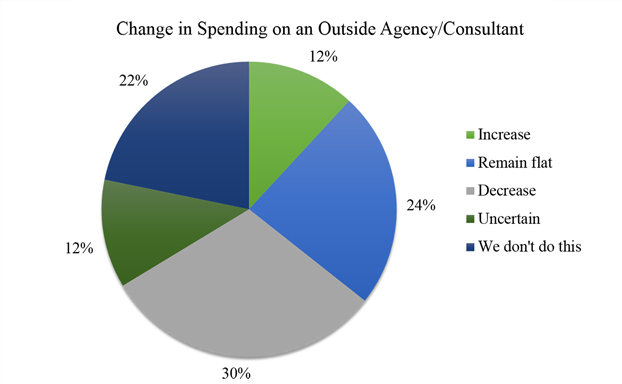In a new survey of 350 SMBs, research firm Clutch found that 30% of these business owners plan to decrease social media spending on an outside agency/consultant in 2015. While a small sample size, the study points to a new era in the competency of the SMB, and this decrease is merely a reflection of that.
Taken from an even smaller sample size (~50), we surveyed LA-area SMBs and found that the top marketing method they were currently engaged in is social media (89%). The Clutch study put the number closer to 50%. If we find the middle and say that around 70% of SMBs are engaged with social media, then clearly the decrease in spending on agencies is not a criticism against social as a media type.
The decrease isn’t necessarily a reflection on the competency of the vendor but appears to be the opposite. After spending a year or two with an expert vendor, it is likely SMBs learned a lot about managing their Facebook page, or overall social presence. Equipped with this knowledge and the endless resources found online, it is likely the SMB can more confidently manage their social channels independently.
Another plausible reason for the decrease in SMB social spend with vendors is the perception among SMBs that vendors aren’t delivering ROI when it comes to social. According to a new Manta study, 60% of SMBs said they do not see ROI from investments in social media. However, I would argue this isn’t a vendor issue but rather an industry-wide struggle of attributing sales to social media activities.
Of course time is still a major challenge for many SMBs and total social management might make sense for these businesses. However, based on a recent Constant Contact study, we found that SMBs enjoy “being the boss” and learning as they go and the migration to self-management may continue for that reason.
Two years ago on Street Fight, I argued the advantages of the business owner over national brands when it comes to social media. Many of those advantages are still relevant today, and are largely why self-management might make more sense from an efficacy point of view:
SMBs that live, work and play in the markets that they serve are better equipped to engage with and respond to everything “local” (e.g. events, weather, news, sentiments, behaviors, et cetera) . . . when you are an SMB, there is no lag time when it comes to capitalizing on the circumstances of your local environment. But unfortunately, there are not enough of these kinds of examples, and the truth is, while many local businesses may be on social media, the majority aren’t getting what they want out of it.
While SMBs might be migrating to the “self-serve” form of social media management, the paid advertising component is definitely gaining steam. According to the Clutch study, while 30% are decreasing spend with a vendor, another 30% are increasing spend on social media ads.

From the perspective of the vendor, consider the first few years of social media management as a relationship building phase with an emphasis on empowering the SMB. The trust built in this time with a client will likely make your organization the first stop when the SMB is ready to invest in paid social promotions.



